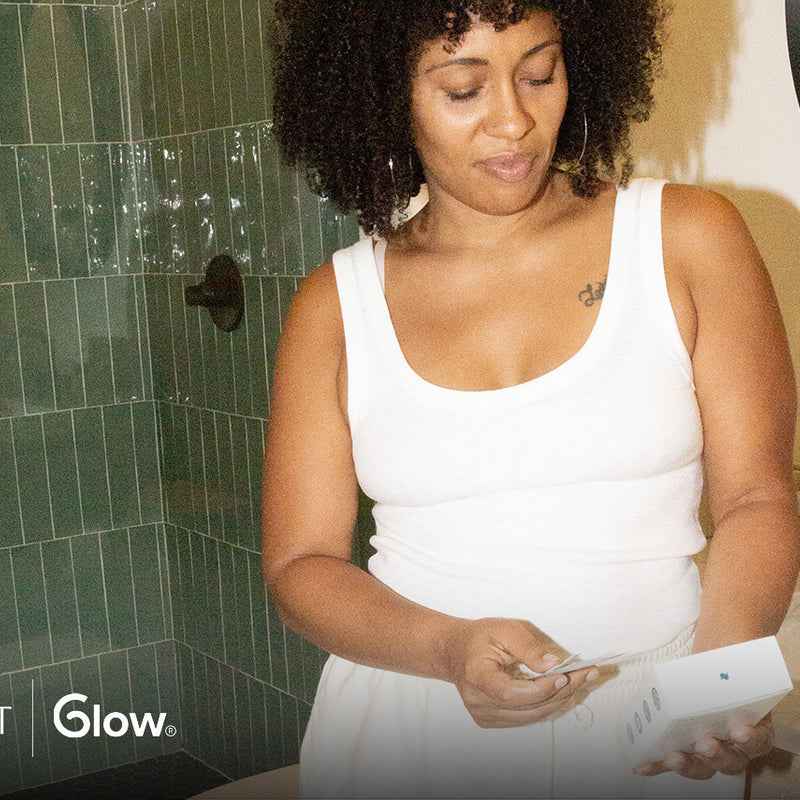Why is My Menstrual Cycle Getting Shorter?

Noticing your menstrual cycle getting shorter? From hormonal imbalances to aging, discover the cause of these changes and how to help regulate your cycle.
There are many different factors that play a role in the menstrual cycle. While the average menstrual cycle length is somewhere between 25 to 30 days, many people fall outside of this range or will notice a change in their cycle at some point during their life. [1]
Understanding the menstrual cycle: How it works and what’s considered normal
The menstrual cycle is a regular cyclical occurrence for those of reproductive age with female anatomy. There are multiple phases of the menstrual cycle, including menstruation, the follicular phase, ovulation, and the luteal phase. [1] The length of the menstrual cycle varies from person to person, but a normal cycle length is considered to fall within 24 to 38 days, and the average cycle length is somewhere between 25 to 30 days. [1-3] At least 20% of women have irregular period cycles, meaning they have cycles that are longer or shorter than the normal range. [2] It’s common to see some changes in cycle length, especially during puberty, perimenopause, and postpartum. There are also many different factors that play a role in the menstrual cycle, including hormone levels. Learning methods for how to track ovulation with irregular periods may help in regulating your menstrual cycle.
The role of hormones in the menstrual cycle
The menstrual cycle is dependent on various hormones rising and falling in order for physiological processes such as ovulation and menstruation to occur. The key hormones related to the menstrual cycle are estrogen, progesterone, follicle stimulating hormone (FSH), and luteinizing hormone (LH). [3]
To simplify it, FSH and LH are seen in high amounts leading up to and during ovulation. These are the hormones responsible for growing and releasing a mature egg. Once ovulation occurs, estrogen and progesterone levels are high in order to prepare the body for potential pregnancy. [2] If pregnancy doesn’t occur, these levels begin to drop again, and menstruation occurs.
Causes of shorter menstrual cycles
So what causes shortened menstrual cycles, and are shorter period cycles something to be concerned about?
Abnormal hormone levels
As discussed, our hormone levels are responsible for the regulation of the menstrual cycle. If someone experiences abnormal hormone levels, it’s likely that the menstrual cycle will be impacted. Abnormal hormone levels may be caused by underlying conditions such as polycystic ovary syndrome (PCOS), thyroid conditions, tumors, age, lifestyle factors, and much more. [2] We’ll touch on each of these a bit more, but if you’re concerned about your hormone levels, you may want to consider a hormone test.
Age
Changing menstrual cycles may also be a sign of perimenopause or menopause. This is commonly seen in those in their late 30s or 40s. Shorter cycle lengths are more likely to point to perimenopause, whereas those experiencing menopause are more likely to have longer cycles. [4] This transition can last a few years and is often marked by a decrease in estrogen levels or various signs and symptoms of perimenopause.
Lifestyle factors
Can dehydration delay your period? Other lifestyle factors such as stress, unhealthy eating habits, extreme exercise, and being underweight or overweight can have an impact on the menstrual cycle. [5] It’s important to try and maintain a healthy weight and eat a balanced diet while using healthy coping skills to deal with stress.
Birth control and other medications
Hormonal contraceptives play a large role in the menstrual cycle and hormone levels. If you’ve recently gotten on hormonal birth control or if you’ve recently stopped taking birth control, it’s normal to see fluctuations in your menstrual cycle for up to three months. [6] It’s important to note that ovulation can occur soon after stopping birth control, so be sure to test for pregnancy and use a back up contraception method if you’re hoping to prevent pregnancy.
Other medications may also play a role in the menstrual cycle and period length. Non-steroidal anti-inflammatory medications (NSAIDs) such as ibuprofen and aspirin and thyroid hormone medications have been shown to impact the menstrual cycle and can help with heavy bleeding. [7-8]
Medical conditions
There are many different conditions that may have an impact on menstrual cycle length. These include PCOS, endometriosis, thyroid conditions, uterine fibroids, primary ovarian insufficiency (POI), and more. [5,9] Any condition that may involve the reproductive organs or endocrine system can play a role in shortened or otherwise irregular menstrual periods. You should speak to a healthcare provider if you’re concerned about any underlying medical conditions.
Can I get pregnant with a short menstrual cycle?
If you are trying to conceive, it can be upsetting to notice changes in your menstrual cycle. Luckily, having shorter menstrual cycles doesn’t necessarily mean you will be unable to get pregnant, but it is important you speak to a healthcare provider before trying to conceive (TTC) to ensure there are no underlying problems that may impact your fertility. Some data does suggest that shorter cycles may reflect ovarian aging or a narrow fertile window, which can be associated with anovulatory cycles. [10] On the bright side, there are ovulation tests and ovulation induction medications available to help you find your fertile window and encourage ovulation.
Can I do anything to lengthen my cycle?
Currently, there are no proven methods to lengthen the menstrual cycle without the use of hormonal contraceptives. If you aren’t trying to conceive at this time and would like to regulate your menstrual cycle, getting on the birth control pill or another form of hormonal contraception can help you lengthen your cycle or in some cases, prevent menstruation from occurring at all. [2] If you are planning to conceive or aren’t interested in hormonal contraception, a supplement known as inositol has been tied to improving ovarian health and regulating menstrual cycles. [11] Inositol has shown positive effects in restoring a regular cycle for women with PCOS and may be useful for those experiencing shorter menstrual cycles as well. [11-12]
When to see a doctor
It’s normal for the menstrual cycle to vary from time to time, especially around puberty, perimenopause, and postpartum. You should always speak to a healthcare provider about your period and sexual health if you have concerns, especially if you notice any of the following:
- Menstrual cycles shorter than 24 days
- Spotting or bleeding in between periods
- Bleeding after menopause
- Bleeding lasting more than eight days
It’s also recommended that you have a preconception visit with your healthcare provider prior to trying to conceive. [13] This would be a good time to discuss your menstrual cycle length or any other concerns you may have.
Key takeaways
- A normal cycle length is considered to fall within 24 to 38 days, and the average cycle length is somewhere between 25 to 30 days.
- At least 20% of women have irregular cycles, meaning they have cycles that are longer or shorter than the normal range.
- The key hormones related to the menstrual cycle are estrogen, progesterone, follicle stimulating hormone (FSH), and luteinizing hormone (LH).
- Some potential causes of short menstrual cycles include abnormal hormone levels, age, lifestyle factors, birth control and other medications, and underlying medical conditions.
- Short periods may be linked to anovulatory cycles, which can make it more difficult to conceive.
- Hormonal contraceptives may be useful for lengthening and regulating menstrual cycles. Inositol supplements have also been shown to help regulate the menstrual cycle in those with PCOS.
- You should always speak with your healthcare provider if you have concerns about your menstrual cycle or fertility.
Dr. Kenosha Gleaton is board-certified in gynecology and obstetrics and is the Medical Advisor of Natalist. She received her MD from MUSC and completed her residency at Carolinas Medical Center in Charlotte, NC.
Dr. Gleaton is passionate about women, youth, and mentoring. She is a Scrubs Camp instructor, a program to increase student entry in healthcare, and serves as a Compassion International adoptive parent. She is also a member of the American College of Obstetrics & Gynecology, the American Association of Gynecologic Laparoscopists, and the American Association of Professional Women.
References:
- Reed BG, Carr BR. The Normal Menstrual Cycle and the Control of Ovulation. [Updated 2018 Aug 5]. In: Feingold KR, Anawalt B, Blackman MR, et al., editors. Endotext [Internet]. South Dartmouth (MA): MDText.com, Inc.; 2000-. Available from: https://www.ncbi.nlm.nih.gov/books/NBK279054/
- McLaughlin J E. Menstrual Cycle. Merck Manual. Last updated September 2022. URL.
- Menstrual Cycle. Cleveland Clinic. Last reviewed 12/09/2022. URL.
- Delamater L, Santoro N. Management of the Perimenopause. Clin Obstet Gynecol. 2018;61(3):419-432. doi:10.1097/GRF.0000000000000389
- Period problems. Office on Women’s Health. Last updated February 2021. URL.
- When will my periods come back after I stop taking the pill? NHS. Last reviewed March 2022. URL.
- Jacobson MH, Howards PP, Darrow LA, et al. Thyroid hormones and menstrual cycle function in a longitudinal cohort of premenopausal women. Paediatr Perinat Epidemiol. 2018;32(3):225-234. doi:10.1111/ppe.12462
- Bofill Rodriguez M, Lethaby A, Farquhar C. Non-steroidal anti-inflammatory drugs for heavy menstrual bleeding. Cochrane Database Syst Rev. 2019;9(9):CD000400. Published 2019 Sep 19. doi:10.1002/14651858.CD000400.pub4
- Klein DA, Paradise SL, Reeder RM. Amenorrhea: A Systematic Approach to Diagnosis and Management. Am Fam Physician. 2019;100(1):39-48.
- Wesselink AK, Wise LA, Hatch EE, et al. Menstrual cycle characteristics and fecundability in a North American preconception cohort. Ann Epidemiol. 2016;26(7):482-487.e1. doi:10.1016/j.annepidem.2016.05.006
- Kachhawa G, Senthil Kumar KV, Kulshrestha V, Khadgawat R, Mahey R, Bhatla N. Efficacy of myo-inositol and d-chiro-inositol combination on menstrual cycle regulation and improving insulin resistance in young women with polycystic ovary syndrome: A randomized open-label study. Int J Gynaecol Obstet. 2022;158(2):278-284. doi:10.1002/ijgo.13971
- Wojciechowska A, Osowski A, Jóźwik M, Górecki R, Rynkiewicz A, Wojtkiewicz J. Inositols' Importance in the Improvement of the Endocrine-Metabolic Profile in PCOS. Int J Mol Sci. 2019;20(22):5787. Published 2019 Nov 18. doi:10.3390/ijms20225787
- Good Health Before Pregnancy: Prepregnancy Care. American College of Obstetricians and Gynecologists. Last reviewed December 2021. URL.
Reach Out, We're Here
Have questions about your order or products? For the speediest answer, check out our FAQ section. Need something else? Come find us below.
Please keep in mind our regular business hours; Monday-Friday, 9am-5pm CT.
Customer Support
support@natalist.com
Press Inquiries
media@everlyhealth.com
Business & Partnerships
team@natalist.com
Affiliates + Influencers
team@natalist.com
Job Openings
Careers Page
























